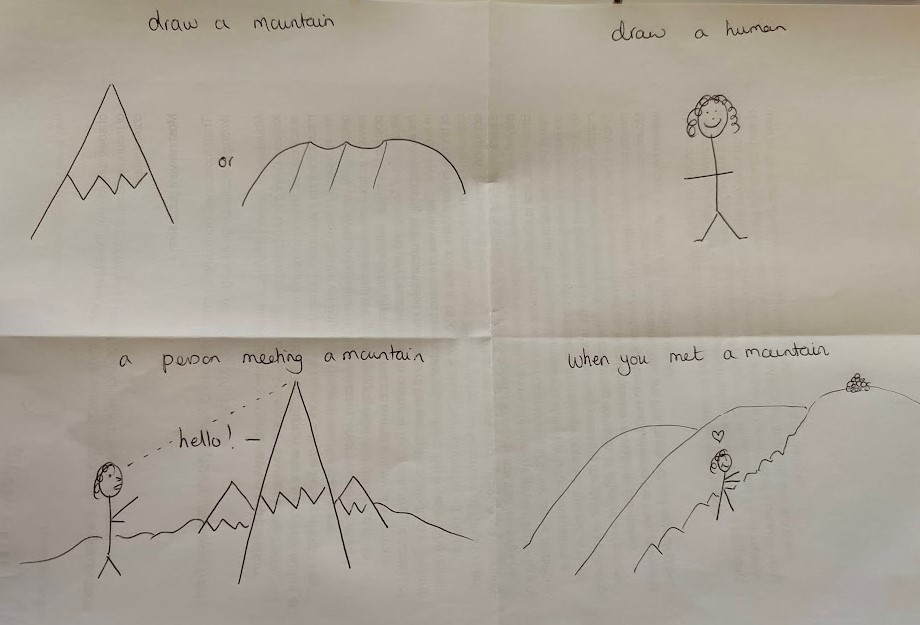Our project on ‘Mountains in ancient literature and culture and their postclassical reception’ has stretched some way beyond its original 3-year duration – and has ended up having a reach far beyond its already-broad title. Two maternity leaves and the small matter of the COVID pandemic have seen the original end-date of July 2020 pushed back to April 2023. Looking ahead to this final, final end-date, Jason and I discussed whether we might organise one more mountains-themed event to mark the close of the project. In July 2018, we organised a panel on ‘Approaching Landscape in the Classical Tradition’ at the 11th Celtic Conference in Classics. In December 2018 we hosted a workshop at Cambo focussed on promoting cross-disciplinary feedback on the draft chapters which would ultimately form our edited volume Mountain Dialogues in Antiquity and Modernity, which looked at mountains in a wide variety of historical contexts.
What to plan which would go beyond the ground already covered by these two events? We were both conscious that the past decade, and particularly the past six years or so, have seen an explosion of interest in and publications on the topic of mountains within the arts and humanities. Over the course of the project we had been lucky enough to encounter many scholars breaking new ground in mountain studies, for example at other mountain events such as Thinking Mountains 2018, the International Mountain Studies Symposium held at Banff in 2019, and Image and Ascent: Mountain Terrains in the History of Art, hosted online by the Warburg Institute in 2020. We therefore decided to try to capture our sense that our project had coincided with a very exciting moment in the study of mountains by planning an event ambitious titled ‘Mountain pathways: the past, present, and future of the mountain humanities’.
We knew we wanted to run a relatively small event with lots of time for intensive discussion, so invited around a dozen scholars working on mountains from a wide variety of arts and humanities disciplines – art history, film studies, performance studies, history, and literature. Since the workshop would be confined to a single day, we requested that participants complete a questionnaire about themselves and their work for circulation in advance, so that everyone would have a sense of one another’s research before the event even started. (These completed questionnaires have since formed the basis of our series of mountain research spotlights). In terms of a schedule, our initial idea was to select around four topics and assign 3 guests to each topic in advance, inviting them to prepare ‘provocations’ for discussion on that theme. The problem was, each and every person easily fit into two, three, or even all possible categories. It also felt somewhat limiting to be setting the topics in advance – if the goal of our event was to gauge thoughts on ‘the mountain humanities’ as either a nascent or potential discipline, our topics really ought to be selected by the group as a whole, not just the two of us who happened to be hosting.
Our solution was to run the event as an ‘unconference’. What is an unconference? It’s a broad term, representing something of a push-back against ‘traditional’ conferences with high participation fees, top-down organisation, and hours of individual paper presentations interspersed with only brief periods for questions and discussion. In an unconference, as much time as possible is made for conversation, and often the topics themselves and the order of discussion are only decided ‘on the day’, when all participants – and not just the organisers – are able to contribute to those choices.
This model seemed to be the perfect solution to our problem. We devised a schedule in the sense of timings for the sessions, but gave them no titles. Our ‘introductory’ session consisted of only a few words from us, and then a lot of time discussing as a group what we should spend the day talking about. It was exciting to see how easily and organically four topics of common interest emerged. We then asked for two people to volunteer to facilitate each session, and each pair went off to discuss exactly how they would do that. Again, the role of the facilitators was not to speak to the topic but to provide some starting points for discussion as a whole group, which everyone did admirably. Possibly the most thought-provoking facilitation came from Carla Benzan and Abbie Garrington, who led us in a drawing exercise inviting us to think about ‘how a mountain feels’.

The only return to a more traditional presentation format came with our online session, in which we heard via Teams from three colleagues who could not join us in person. Even then, we allowed for plenty of time for discussion and many of the ideas shared during the Teams session recurred in conversations throughout the rest of the day.
One of the fantastic things about the unconference model is that it makes space for the unexpected. Topics were explored that we probably wouldn’t have put on pre-arranged schedule, in ways that the two of us hadn’t even imagined in advance. We did choose the topic of our final session, which was a discussion of what, if anything, ought to come out of the day. Again, the format allowed for the unexpected, with a suggestion from one participant, and the enthusiasm of everyone else, leading us to find ourselves taking the lead in planning a collaborative, many-authored article about the mountain humanities (watch this space!).
Throughout our project we have gained so much from opportunities to have in-depth conversations with colleagues working on mountains from across a wide range of disciplines. Our final ‘unconference’, then, felt very much like the right way to mark the end of 6 years of discussing mountains and drawing connections with others – and, perhaps, to look ahead to more such conversations in future.
